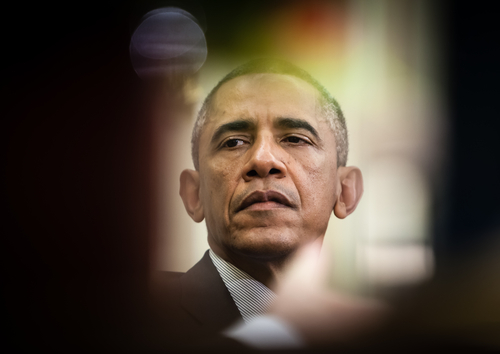
In a striking display of public dissent, President Joe Biden's high-stakes fundraiser at Radio City Music Hall, aimed at amassing a substantial $25 million for his re-election campaign, was marred by significant disruptions. The event, which saw tickets being sold for as much as $500,000, was not just a gathering of Democratic elites but became a stage for vocal protesters to air their grievances. This incident, occurring on March 29th, 2024, underscores the growing chasm between the political establishment and the concerns of the American people.
The presence of former Presidents Barack Obama and Bill Clinton alongside Biden was intended to solidify support and showcase a united Democratic front. However, the convergence of these political heavyweights also attracted the attention of activists, particularly those advocating for Palestinian rights and expressing fears over escalating tensions with Russia. Their bold interruption of the event sends a clear message: significant segments of the population feel their voices are sidelined in the national discourse.
Biden’s $500,000/seat NYC fundraiser with Obama, Clinton, heckled by a protester yelling “GENOCIDE!” at the stage.
— 1776 (@TheWakeninq) March 29, 2024
Critics argue that the exorbitant ticket prices for the fundraiser epitomize the disconnect between the Democratic leadership and the average American. While the party champions policies purportedly aimed at the middle and working classes, events like these suggest a preference for courting wealthy donors over engaging with grassroots supporters. This perception of elitism could potentially alienate voters who feel their interests are being overlooked in favor of big-money interests.
Moreover, the choice of venue and the high-profile guest list highlight a concerning trend of prioritizing spectacle over substance. As the country grapples with pressing issues such as economic instability, social unrest, and foreign policy challenges, the optics of three former presidents participating in a glitzy fundraiser can seem tone-deaf. It raises questions about the Democratic Party's commitment to addressing the real and urgent needs of its constituents.
#BidenHarris2024 donors heckled by Palestine protesters as they leave Joe Biden's $25M New York fundraiser at Radio City featuring Bill Clinton, Barack Obama, Lizzo, and Queen Latifahpic.twitter.com/klagH37NKX
— Brendan (@BrendanMcInnis) March 29, 2024
The protest also brings to the forefront the contentious issue of the Israeli-Palestinian conflict, a topic that has historically divided Americans. The demonstrators' accusations of Biden having "blood on his hands" reflect the deep frustrations over U.S. foreign policy in the Middle East. This incident serves as a reminder of the complexities and sensitivities surrounding America's role on the global stage, and the need for a more nuanced and empathetic approach.
Additionally, the mention of a potential nuclear war with Russia by protesters underscores the anxiety permeating American society regarding international relations and security. In an era where geopolitical tensions are at a boiling point, the public's fear of escalation into conflict cannot be dismissed lightly. The administration's handling of these fears will be a critical test of its diplomatic acumen and commitment to peace.
The disruption at Radio City Music Hall is emblematic of a broader dissatisfaction with the current political landscape. As the 2024 presidential election looms, the Democratic Party faces the challenge of reconciling its pursuit of high-dollar donations with the imperative to remain accessible and responsive to the electorate. The incident serves as a stark reminder that genuine engagement with the concerns of ordinary Americans is indispensable for maintaining political legitimacy and trust.
In conclusion, the protest at the Biden fundraiser is a microcosm of the larger issues plaguing American politics today. As the nation moves closer to another election cycle, the Democratic Party must heed the lessons from this episode. Bridging the gap between the political elite and the populace, addressing the root causes of social and economic discontent, and fostering a more inclusive and transparent dialogue are essential steps toward healing a divided nation.










